Italian child star Ermanno Roveri (1903-1968) played the lead in silent melodramas like Il piccolo patriota padovano/The little patriot from Padua (1915) and Naufragio/Shipwreck (1916).
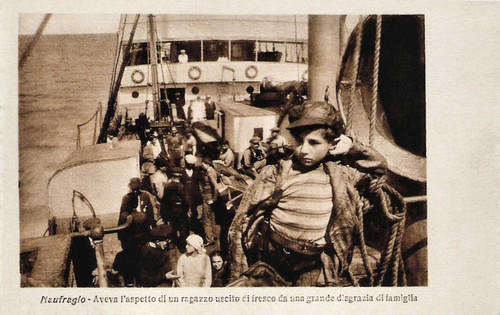
Italian postcard by Film Artistica Floria, Torino (Turin), no. 3404. Printed by Uff. Rev. St. Terni, 16-5-17. Publicity still for Naufragio/Shipwreck (Umberto Paradisi, 1916). Translation caption: "He had the look of a boy who just came out of a big family misfortune."
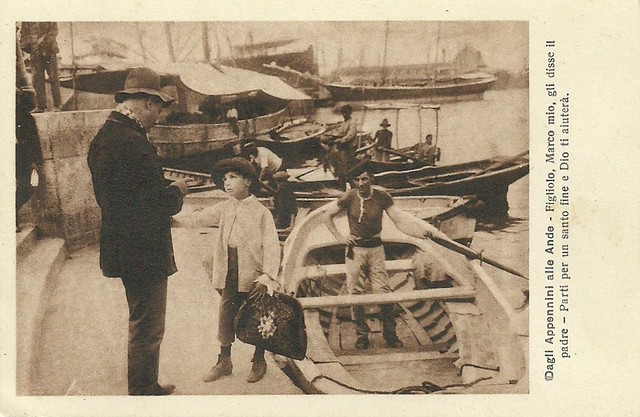
Italian postcard for the film Dagli Appennini alle Ande/From the Apennines to the Andes (Umberto Paradisi, 1916), an adaptation of one of the stories of Edmondo De Amicis' novel Cuore/Heart, and starring Ermanno Roveri. Translation caption: "'Dear son, Marco mine', his father said to him, 'you now leave on a holy mission and God will help you'."
The background may be the harbour of Genoa. Young Marco from Genoa sails to Buenos Aires to visit his seriously ill mother, who emigrated for work. While his mother refuses any cure, Marco wanders around endlessly in search of his mother, following the traces of the family for whom his mother worked, all over Argentine until the foot of the Andes mountains. He first joins a caravan, but when they abandon him, he continues on his own, until he finds his mother, who then accepts to be operated and cured.
Ermanno Roveri played in Naufragio/Shipwreck (Umberto Paradisi, 1916) a Sicilian orphan, Mario, who is repatriated from Liverpool to Sicily.
On the boat he meets Giulietta (played by Ermanno’s sister, Lavinia Roveri), who has to return to her parents in Naples. During a tempest the boat sinks and Mario offers his seat in the lifeboat to Giulietta. Mario drowns on the sinking ship.
Naufragio was a production of Gloria, the film company in Turin that also produced the first films of diva Lyda Borelli.
Gloria produced a series of films based on the stories in Cuore/Heart (1886) by Edmondo De Amicis. These included Il piccolo scrivano Fiorentino/The little scribe from Florence (Leopoldo Carlucci, 1915) and Il piccolo patriota padovano/The little patriot from Padua (Leopoldo Carlucci, 1915).
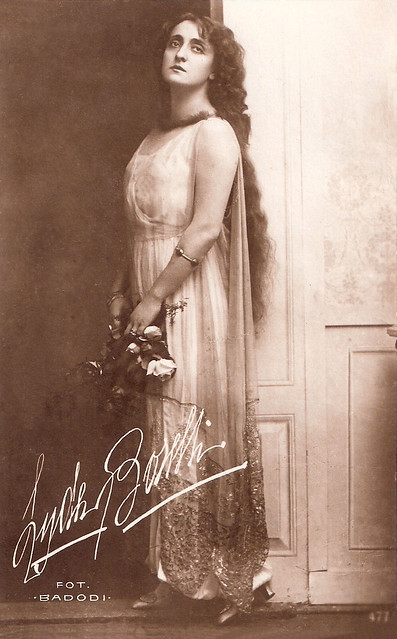
Lyda Borelli. Italian postcard, no. 471. Photo: Attillio Badodi.
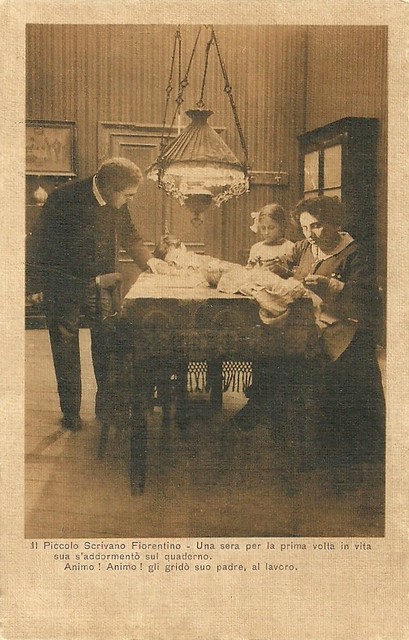
Italian postcard. Ermanno Roveri in the Gloria production Il piccolo scrivano Fiorentino/The little scribe from Florence (Leopoldo Carlucci, 1915). Translation caption: "One night, for the first time in his life, he fell asleep over his notebook. Wake up! Wake up! his father shouted to him, Get to work!"
In this film, based on one the stories from Edmondo De Amicis' book Cuore/Heart (1886), Giulio (Roveri), a 12-year old boy from Florence, lacks sleep as he secretly helps his father (Antonio Monti) copying volumes at night. His parents reproach him, as he loses weight and lacks attention in school. One night, however, the father discovers the secret.
Ermanno Roveri was one of the stars of Gloria. He was born in 1903 in Milan, Italy. As a child he had become famous as Frugolino, one of the comic child actors of the Cines company in Rome.
Among his early films were Il Trabocchetto punitore/Fatal Trap Door (1912) with Emilio Ghione and Amleto Novelli, and Il Portafoglio rosso/The Lost Pocket-Book (Guglielmo Zorzi, 1914) with Lea Giunchi. Ermanno appeared opposite diva Leda Gys in Il Piccolo cerinaio/The small cerinaio (Augusto Genina, 1914).
For Gloria, Ermanno appeared in such films as Dagli Appennini alle Ande/From the Apennines to the Andes (Umberto Paradisi, 1916) and La Felicità/Happiness (Guglielmo Zorzi, 1917).
In the 1930s and 1940s Ermanno Roveri played in a dozen Italian films including Tempo massimo/Full Speed (Mario Mattoli, 1934) and L'Uomo che sorride/The Man Who Smiles (Mario Mattoli, 1936), both starring Vittorio de Sica.
His last film appearance was in I Due sergenti/The Two Sergeants (Carlo Alberto Chiesa, 1951) with Antonella Lualdi.
Till his death, Ermanno Roveri would work on in the theatre and incidentally for the cinema or the television. He died in 1968 in Milan, Italy. He was 65.
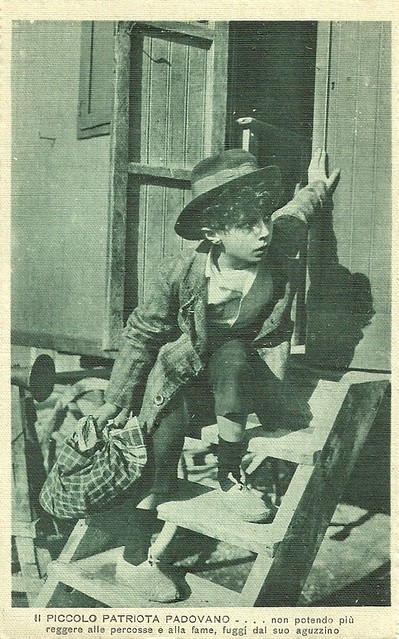
Italian postcard. Ermanno Roveri in the Gloria production Il piccolo patriota padovano/The little patriot from Padua (Leopoldo Carlucci, 1915). Translation caption: "...No longer able to stand the beatings and the hunger, he escapes his tormentor."
In this film, again adapted from one of the stories from Cuore/Heart (1886) by Edmondo De Amicis, a young boy from Padua (Roveri) dressed in rags is discovered on a boat to Genoa. His poor parents have sold him to acrobats, who maltreat him. During a stop in Barcelona he flees to the Italian consul who helps him return. Aboard the ship to Italy he is nurtured, dressed and foreign visitors give him money, but when he overhears them talking badly about Italy and the Italians, he throws them back the money, not supporting alimony from those who insult his country.
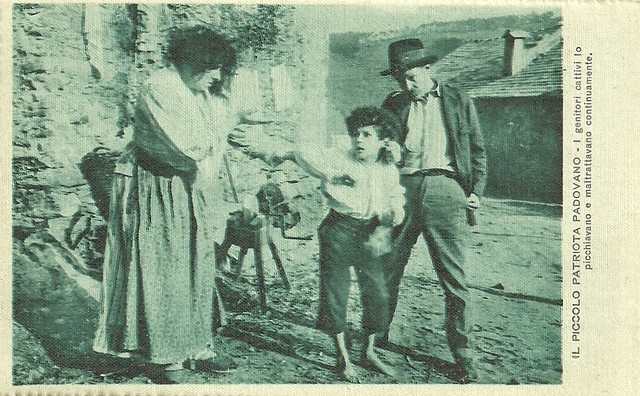
Italian postcard. Ermanno Roveri in Il piccolo patriota padovano/The little patriot from Padua (Leopoldo Carlucci, 1915). Translation caption: "His bad parents continuously beat and abused him".
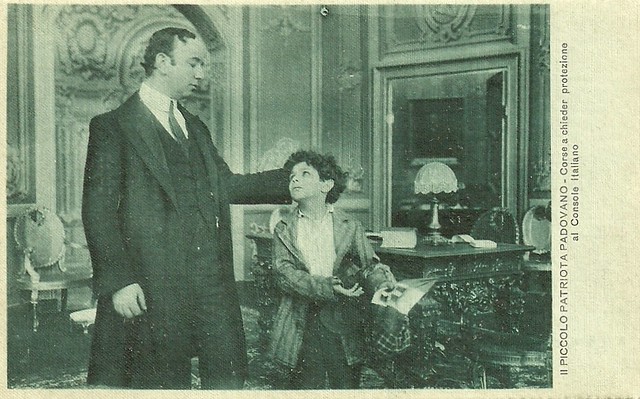
Italian postcard. Ermanno Roveri in Il piccolo patriota padovano/The little patriot from Padua (Leopoldo Carlucci, 1915). Translation caption: "He ran to ask for protection to the Italian consul."
Sources: Vittorio Martinelli (Il Cinema Italiano 1916) and IMDb.

Italian postcard by Film Artistica Floria, Torino (Turin), no. 3404. Printed by Uff. Rev. St. Terni, 16-5-17. Publicity still for Naufragio/Shipwreck (Umberto Paradisi, 1916). Translation caption: "He had the look of a boy who just came out of a big family misfortune."

Italian postcard for the film Dagli Appennini alle Ande/From the Apennines to the Andes (Umberto Paradisi, 1916), an adaptation of one of the stories of Edmondo De Amicis' novel Cuore/Heart, and starring Ermanno Roveri. Translation caption: "'Dear son, Marco mine', his father said to him, 'you now leave on a holy mission and God will help you'."
The background may be the harbour of Genoa. Young Marco from Genoa sails to Buenos Aires to visit his seriously ill mother, who emigrated for work. While his mother refuses any cure, Marco wanders around endlessly in search of his mother, following the traces of the family for whom his mother worked, all over Argentine until the foot of the Andes mountains. He first joins a caravan, but when they abandon him, he continues on his own, until he finds his mother, who then accepts to be operated and cured.
Sicilian Orphan
Ermanno Roveri played in Naufragio/Shipwreck (Umberto Paradisi, 1916) a Sicilian orphan, Mario, who is repatriated from Liverpool to Sicily.
On the boat he meets Giulietta (played by Ermanno’s sister, Lavinia Roveri), who has to return to her parents in Naples. During a tempest the boat sinks and Mario offers his seat in the lifeboat to Giulietta. Mario drowns on the sinking ship.
Naufragio was a production of Gloria, the film company in Turin that also produced the first films of diva Lyda Borelli.
Gloria produced a series of films based on the stories in Cuore/Heart (1886) by Edmondo De Amicis. These included Il piccolo scrivano Fiorentino/The little scribe from Florence (Leopoldo Carlucci, 1915) and Il piccolo patriota padovano/The little patriot from Padua (Leopoldo Carlucci, 1915).

Lyda Borelli. Italian postcard, no. 471. Photo: Attillio Badodi.

Italian postcard. Ermanno Roveri in the Gloria production Il piccolo scrivano Fiorentino/The little scribe from Florence (Leopoldo Carlucci, 1915). Translation caption: "One night, for the first time in his life, he fell asleep over his notebook. Wake up! Wake up! his father shouted to him, Get to work!"
In this film, based on one the stories from Edmondo De Amicis' book Cuore/Heart (1886), Giulio (Roveri), a 12-year old boy from Florence, lacks sleep as he secretly helps his father (Antonio Monti) copying volumes at night. His parents reproach him, as he loses weight and lacks attention in school. One night, however, the father discovers the secret.
Child Actor
Ermanno Roveri was one of the stars of Gloria. He was born in 1903 in Milan, Italy. As a child he had become famous as Frugolino, one of the comic child actors of the Cines company in Rome.
Among his early films were Il Trabocchetto punitore/Fatal Trap Door (1912) with Emilio Ghione and Amleto Novelli, and Il Portafoglio rosso/The Lost Pocket-Book (Guglielmo Zorzi, 1914) with Lea Giunchi. Ermanno appeared opposite diva Leda Gys in Il Piccolo cerinaio/The small cerinaio (Augusto Genina, 1914).
For Gloria, Ermanno appeared in such films as Dagli Appennini alle Ande/From the Apennines to the Andes (Umberto Paradisi, 1916) and La Felicità/Happiness (Guglielmo Zorzi, 1917).
In the 1930s and 1940s Ermanno Roveri played in a dozen Italian films including Tempo massimo/Full Speed (Mario Mattoli, 1934) and L'Uomo che sorride/The Man Who Smiles (Mario Mattoli, 1936), both starring Vittorio de Sica.
His last film appearance was in I Due sergenti/The Two Sergeants (Carlo Alberto Chiesa, 1951) with Antonella Lualdi.
Till his death, Ermanno Roveri would work on in the theatre and incidentally for the cinema or the television. He died in 1968 in Milan, Italy. He was 65.

Italian postcard. Ermanno Roveri in the Gloria production Il piccolo patriota padovano/The little patriot from Padua (Leopoldo Carlucci, 1915). Translation caption: "...No longer able to stand the beatings and the hunger, he escapes his tormentor."
In this film, again adapted from one of the stories from Cuore/Heart (1886) by Edmondo De Amicis, a young boy from Padua (Roveri) dressed in rags is discovered on a boat to Genoa. His poor parents have sold him to acrobats, who maltreat him. During a stop in Barcelona he flees to the Italian consul who helps him return. Aboard the ship to Italy he is nurtured, dressed and foreign visitors give him money, but when he overhears them talking badly about Italy and the Italians, he throws them back the money, not supporting alimony from those who insult his country.

Italian postcard. Ermanno Roveri in Il piccolo patriota padovano/The little patriot from Padua (Leopoldo Carlucci, 1915). Translation caption: "His bad parents continuously beat and abused him".

Italian postcard. Ermanno Roveri in Il piccolo patriota padovano/The little patriot from Padua (Leopoldo Carlucci, 1915). Translation caption: "He ran to ask for protection to the Italian consul."
Sources: Vittorio Martinelli (Il Cinema Italiano 1916) and IMDb.
No comments:
Post a Comment